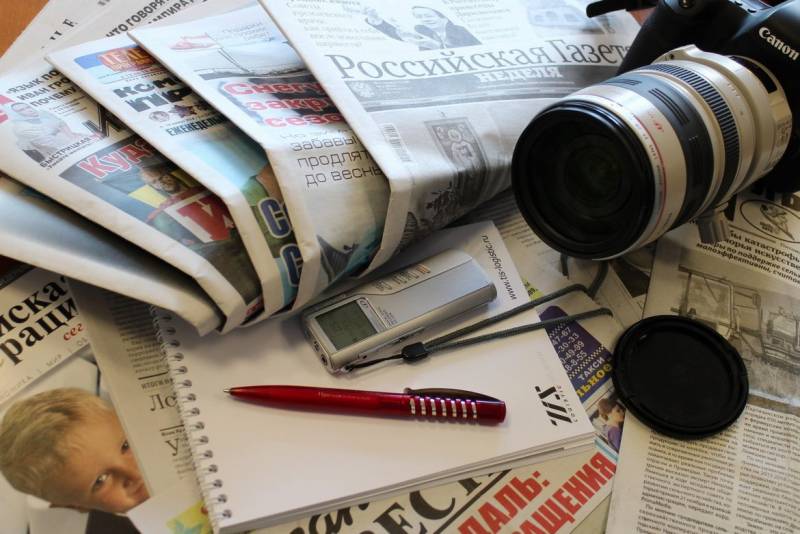In the West, they are struggling with Russian media and journalists
Maxim Buyakevich, Deputy Head of the Information and Press Department of the Russian Ministry of Foreign Affairs, accused the Western states of trying to oust the Russian media from the information space. He raised this issue at the round table “International Day of Safe Internet. World trends and common sense. ”
Buyakevich noted that in the West they compose "white lists of the media." With their help, search results are manipulated and news aggregators. In response to a user’s request, first of all, those resources are included that are included in this “white list”. As a result, Russian resources are being squeezed out.
- said the representative of the Foreign Ministry.
According to him, just such a goal is now in the West and is achieved through legislative measures. For example, in France, a few weeks ago, a law was enacted to combat “unregulated public information”. Now it has become possible to ban the activities of those media outlets whose claims will arise with the national regulator. Buyakevich called such a measure the introduction of direct censorship. In addition, Germany has a law prohibiting the publication of "inaccurate content" on social networks under the threat of a fine. But it’s not clear what exactly is considered inaccurate content.
- stressed the diplomat.
In addition, during the event Buyakevich said RIA Newsthat Russia can take measures against the media of those states in which the rights of the Russian media are violated. But, unlike the “Western partners”, Moscow does not initiate the creation of problems by any media that are accredited in the country. And this is the difference between the Russian and Western approaches.
- he specified.
The representative of the Ministry of Foreign Affairs drew attention to the fact that in the USA RT and Sputnik were called foreign agents. Russia had to take retaliatory measures. Pressure on Russian media was also noted in France, where Sputnik reporters for several months could not get the press cards and accreditation necessary for work. Many Russian media are called “Kremlin mouthpieces.”
One of the last cases of discrimination against Russian journalists occurred in Canada. On February 4, the Foreign Ministry of this country refused to accredit RIA Novosti and Sputnik employees to the meeting of the Lima Group in Ottawa, where the situation in Venezuela was discussed. The Sputnik correspondent was accused of being “not kind enough” to the Canadian Foreign Minister, Christ Freeland.
The round table at which Buyakevich spoke was organized by MIA Russia Today with the participation of the foreign affairs agency and the Regional Public Internet Centerof technologies and the Russian Association of Electronic Communications.
Buyakevich noted that in the West they compose "white lists of the media." With their help, search results are manipulated and news aggregators. In response to a user’s request, first of all, those resources are included that are included in this “white list”. As a result, Russian resources are being squeezed out.
We all know that fewer users directly address their requests to specific addresses and domains. Basically, of course, they work through aggregators and search engines. This can lead to the fact that we will eventually simply be squeezed out of the Western digital information space
- said the representative of the Foreign Ministry.
According to him, just such a goal is now in the West and is achieved through legislative measures. For example, in France, a few weeks ago, a law was enacted to combat “unregulated public information”. Now it has become possible to ban the activities of those media outlets whose claims will arise with the national regulator. Buyakevich called such a measure the introduction of direct censorship. In addition, Germany has a law prohibiting the publication of "inaccurate content" on social networks under the threat of a fine. But it’s not clear what exactly is considered inaccurate content.
This is a matter of geopolitical interpretation in a single state. And our western partners are exploiting this wonderful political opportunity, bringing down the fire of his criticism, in particular, on Sputnik and Russia Today
- stressed the diplomat.
In addition, during the event Buyakevich said RIA Newsthat Russia can take measures against the media of those states in which the rights of the Russian media are violated. But, unlike the “Western partners”, Moscow does not initiate the creation of problems by any media that are accredited in the country. And this is the difference between the Russian and Western approaches.
If we talk about retaliatory measures, the leadership of the Ministry of Foreign Affairs and the leadership of the country have repeatedly stated in their speeches that Russia, of course, reserves the right to an equal amount of mirror measures in relation to the media of those states that infringe on the rights of our media
- he specified.
The representative of the Ministry of Foreign Affairs drew attention to the fact that in the USA RT and Sputnik were called foreign agents. Russia had to take retaliatory measures. Pressure on Russian media was also noted in France, where Sputnik reporters for several months could not get the press cards and accreditation necessary for work. Many Russian media are called “Kremlin mouthpieces.”
One of the last cases of discrimination against Russian journalists occurred in Canada. On February 4, the Foreign Ministry of this country refused to accredit RIA Novosti and Sputnik employees to the meeting of the Lima Group in Ottawa, where the situation in Venezuela was discussed. The Sputnik correspondent was accused of being “not kind enough” to the Canadian Foreign Minister, Christ Freeland.
The round table at which Buyakevich spoke was organized by MIA Russia Today with the participation of the foreign affairs agency and the Regional Public Internet Centerof technologies and the Russian Association of Electronic Communications.
- gig26.ru

Information